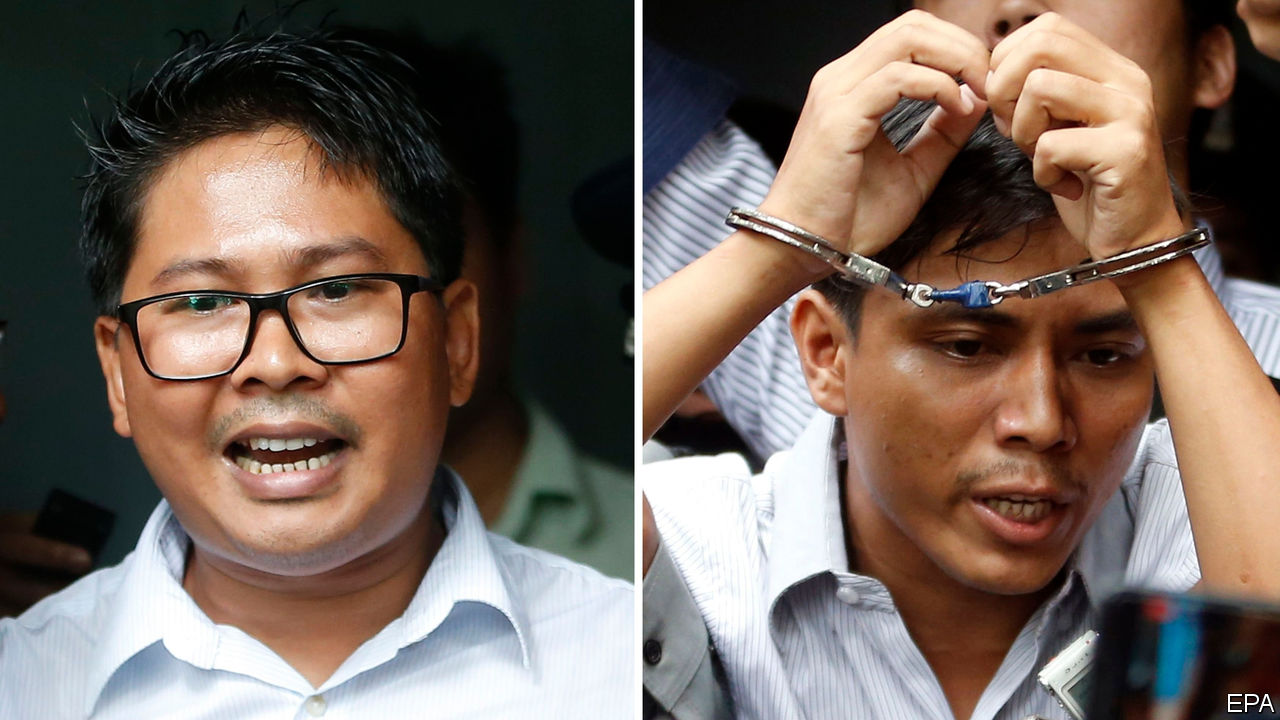
A WEEK after a team of UN investigators said Myanmar’s most senior generals should be tried for committing genocide against the Rohingya people of Rakhine state in western Myanmar, a judge in Yangon imposed seven-year jail terms on two Burmese journalists working for Reuters news agency who had been investigating the killings of Rohingya men found in a mass grave.
The reporters’ crime, the judge read, was to have been found in possession of confidential government material. This, he ruled, was a breach of the country’s colonial-era Official Secrets Act. In fact the journalists, Wa Lone and Kyaw Soe Oo, had not stolen the documents. The papers had been handed to them by police officers over dinner. The correspondents were arrested upon leaving the restaurant. Soon afterwards a spokesperson for the ruling party, the National League for Democracy, who is also a confidant of Aung San Suu Kyi, Myanmar’s de facto leader, said he thought the pair had been deliberately “set up”. Miss Suu Kyi’s civilian government does not control the armed forces or the police. But Myanmar’s then president, Htin Kyaw, another of her close allies, gave authorisation for the case to proceed.
The sentencing concluded a farcical nine-month trial. One witness had to read out notes written on his hand in order not to forget the location where the pair had been arrested. A police officer failed to show up in the courtroom to testify. The judge fell ill. A police captain told the court that the journalists had indeed been framed. He was promptly jailed himself.
No one denies that the massacre the journalists were looking into occurred—not even the army, which admitted responsibility and claimed it had jailed seven soldiers for their involvement. But a few days later Myanmar’s public broadcaster said the soldiers were free again. When the foreign press got hold of the story of the release a spokesperson for the government dismissed it as “false news”.
The authorities do not allow foreign journalists to travel freely to Rakhine state, where the army’s brutal response to an attack by Rohingya rebels prompted an exodus of over 700,000 Rohingyas into neighbouring Bangladesh. The government has set up a series of committees to investigate allegations of atrocities by the army, but several foreigners invited to sit on them have quit, describing them as whitewash. The head of the latest inquiry said its job was not to apportion blame.
Saddest of all has been the reaction of Miss Suu Kyi. She has refused to defend the two journalists and has parroted the prosecution’s case. She has also failed to speak up for the Rohingyas, a mostly Muslim group that many of her Buddhist supporters deem a threat to their country and religion. She may have decided to adopt this stance in order not to upset the army, fearing that antagonising it might derail the country’s democratic transition for which she battled for so long. But if Burmese journalists end up in jail for trying to uncover the truth about an alleged genocide conducted on her watch, that raises questions about how committed to democracy she really is.









